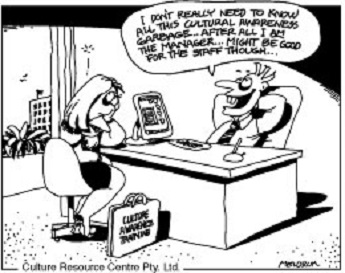Blog Culture@Work
Welcome! My name is Joost Thissen and here I like to share cultural columns and insights for those of us who are interested in culturally diverse and global workplaces.


Welcome! My name is Joost Thissen and here I like to share cultural columns and insights for those of us who are interested in culturally diverse and global workplaces.


cultural column  Email This Post
Email This Post
Developing intercultural competence: who needs to learn what about whom? In our training practice, we occasionally run into people who do not seem to value the link between developing intercultural competence and the ability to deal with cultural differences within multicultural workplaces.
We will look at two cases where the managers fail to recognise the need to develop their own intercultural competence to be able to effectively manage the differences in their multicultural teams. In one case this led to unacceptable high turnover of staff, in the other to communication breakdown between the manager and team members.
Setting
We facilitated training for a group of eight operational managers who all manage Subject Matter Experts (SME) teams from a range of Asian countries for an international organisation in Australia. The aim was to recognise and align management styles with the needs and expectations of the culturally diverse SME to enhance team productivity.
Training pre-work
Prior to the training, we invited the managers to participate in a validated on-line self-assessment to measure the current level of intercultural competence. All but one manager completed the assessment immediately: this one manager needed a few reminders. We found out from the results of the assessment, that this managers’ scores on four intercultural competencies – intercultural sensitivity, intercultural communication skills, commitment to building relationships, and ability to deal with uncertainty – not only rated extremely low compared to the other managers, but also to our international database.
The executive manager – who organised the training – warned us that one of the operational managers repeatedly expressed doubts about the need for managers to be trained. According to the executive, this manager had also returned a staff turnover of close to 60% in the previous year. Unbeknownst to the executive, we already figured out who that manager was. Later, during the training this manager was not overly committed to participate and dismissive of some of his culturally diverse staff: “if they don’t like my style they should look for another job”.
As per schedule, a couple of weeks later we facilitated staff training for the diverse group of SME: here we focused on exploring and enhancing intercultural communication skills. Most of the SME’s reported open and frank discussions with their manager about re-aligning management style, needs and expectations. The experts who belonged to the team managed by the manager with the high turnover however, expressed being fearful of him and commented about his racist behaviour, ‘colonial dominance’ and personal attacks on staffs’ accents and communication style. In our evaluation and recommendation report, we included the comments about all the SME.
Result
The executive manager was extremely concerned about some of the comments, but despite his repeated offer to the manager to engage in individual coaching, he ignored the offer. He told the executive “I am the manager; they have to adapt to me”. Staff turnover remained alarmingly high for the second year in a row. Eventually the manager was let go.
Managers who are not open to developing intercultural competencies limit their own effectiveness and fail to understand and get the best out of their culturally diverse staff.
Setting
The second example is equally telling: a UK line manager of a virtual (and predominantly) Asian team decided to engage us to train his team to enhance accountability within his multicultural team.
Training pre-work
Before the training, the team members and manager completed an validated on-line self-assessment to measure the current level of intercultural cultural competence. The team profile, including the line manager, were below average on two specific competencies: intercultural sensitivity and intercultural communication. When we shared the overall team profile with the manager he was surprised that the team scored so low on intercultural communication. He was certainly not aware of any problems…
We incorporated a training activity via live virtual breakout sessions that focused specifically on practicing intercultural communication skills to be able to work on shared and aligned task and process strategies. During the online activity, the line manager mentioned that he found it rather tedious to spend valuable time finding out if everybody agreed to the same strategies. He encouraged his staff “just speak up and make yourselves heard”. In a discussion about different style of directness in communicating the manager stated: “It could well be that some people prefer to be indirect… but I do not appreciate people beating around the bush”.
The more hierarchically oriented Asian team members hinted carefully that they were more used to following a managers’ lead rather than speak up, especially when they do not agree. This resulted in hardly any of the members speaking up or participating productively during the actual activity – and when they spoke it was simply to agree with the manager. One of the staff reasoned in a breakout session “Our line manager evaluates our performance and is key to our future career”.
Result
The open discussion about task and processes strategies to increase the overall productivity were seriously compromised by the manager. This seems a rather obvious problem; if a manager does not have the intercultural competencies to fully understand and appreciate cultural differences in the importance of hierarchy and the impact on communication, how can you identify cultural issues and address them?
To achieve the defined learning outcomes from intercultural competence training requires that all participants are motivated to explore cultural self-awareness, to acquire knowledge, and to practice new skills to be able to act in more effective culturally appropriate ways.
As we have seen in the cases, both managers actually feel that they are doing an effective job but that their staff are lacking… They reason that it is actually the responsibility of the culturally diverse staff to develop the intercultural competencies to adjust to the manager’s preferences and to the management style. Not the managers…
Increasingly, multicultural organisations recognise the value of developing intercultural competence for better and more inclusive results. This includes that prior to selecting the right manager, having the candidate manager assessed for motivation and people skills to manage multicultural teams, rather than selecting those managers who perform the technical job perfectly. Selecting managers who are task and people oriented, and motivated to get the best out of their culturally diverse staff seems the more effective management approach in multicultural organisations and our global world.
To be able to benefit from cultural diversity, effective multicultural organisations invest in developing intercultural competence for both management and staff: it prevents – among a range of other challenges – staff turnover and communication breakdown.
_________________________________________
Joost Thissen, Partner & Interculturalist
joost@cultureresourcecentre.com.au
cultural column  Email This Post
Email This Post